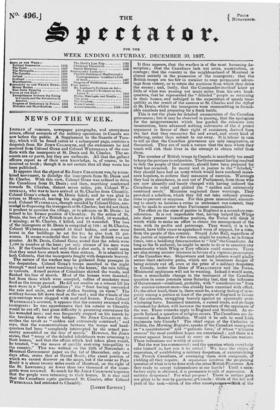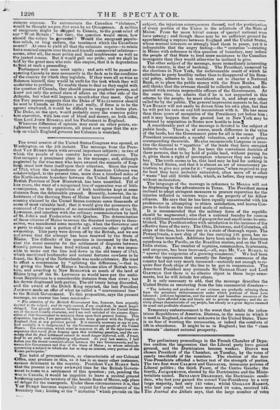NEWS OF THE WEEK.
INSTEAD of rumours, newspaper paragraphs, and anonymous letters, official accounts of the military operations in Canada are now before the public. A Supplement to the Gazette of Tues- day, which will be found entire at a subsequent page, contains a despatch from Sir JOHN COLBORNE, and the statements he had received from Colonel GORE and Colonel WETHERALL of the con- flicts with the insurgents at St. Denis and St. Charles. The ac- counts are ex parte, but they are authentic. All that the gallant officers report as of their own knowledge, is, of course, to be received as truth ; though it is not certain that all they wrote has been published.
It appears that the object of Sir JOHN COLBORNE was, by a com- bined movement, to dislodge the insurgents from St. Denis and St: Charles. With this view, Colonel GORE was ordered to drive the Canadians from St. Denis; and then, marching southward towards St. Charles, distant seven miles, join Colonel WE- THERALL, who was to have arrived at St. Charles from Chambly. Colonel GORE'S attack on St. Denis failed; and he was glad to return to Montreal, leaving his single piece of artillery in the road. Colonel WETHERALL, though unaided by Colonel GORE, suc- ceeded in dispersing the insurgents at St.Charles ; but (lid not think it prudent to garrison the village, or to advance on St. Donis: he retired to his former position of Chambly. In the action of St. Denis, the loss of the British is set down at 6 killed, 10 wounded, 6 missing; at St. Charles, 3 killed, and 18 wounded. The loss of the insurgents at St. Denis is computed at 100: at St.Charles, Colonel WETHERALL counted 56 dead bodies, and some were burnt in the buildings he set fire to; he also took 25 pri- soners. It seems wonderful that the loss of the British was not greater. At St. Denis, Colonel GORE stated that the rebels were 1,500 in number at the least ; yet only sixteen of his men were hit. If the Canadians had only fired a shot each, it would seem that they must have struck more than sixteen. It is admitted by both Colonels, that the insurgents fought with desperate bravery. The nature of the warfare may be gathered from passages in the despatches. Colonel GORE'S troops marched in the night through "mud and water reaching to the knees," the rain falling in torrents. Armed parties of Canadians skirted the woods, and flanked his line of march. Most of the houses were deserted; but from those which were occupied, vollies of musketry were fired as the troops passed. Ile did not resolve on a retreat till his men were in a "jaded condition ;" the " frost having succeeded the rain and snow, and their clothes freezing on them." The artillery-horses fell down dead on the road ; and the wheels of the gun-carriage were clogged with mud and frozen. From Colonel WETHERALL'S account, it appears that the country swarmed with Insurgents: he was apprehensive that his retreat to Chambly would be cut off; had great difficulty in procuring conveyance for his wounded men ; and was frequently stopped on his march by the breaking down of the bridges. Sir JOHN COLBORNE de- scribes the revolt as " sudden and extensively combined;" and says, that the communications between the troops and head- quarters had been " completely interrupted by the armed pea- santry assembled on the line of march." However, Sir JOHN states, that " many of the deluded inhabitants were returning to their homes," and that the affairs which had taken place would, be trusted, " be the means of quickly restcring tranquillity to the country." This was written on the 29th of November : a Montreal Government paper on the 1st of December, only two days after, states that at Grand Brute, (the exact position of which we cannot discover on the maps, but if the same as Pays Brule it is about twenty miles north of Montreal, on the right of the St. Lawrence,) no fewer than two thousand of the insur- gents were reviewed. So much for Sir JOHN CommeNE's opinion that the people were returning to their 'Ionics. It is also said that the Canadians again garrisoned St. Charles, after Colonel WETDERALL had retreated to Chambly.
It thus appears, that the warfare is of the most harassing de- scription; that the Canadians lack not arms, ammunition, or courage; that the country in the neighbourhood of Montreal is almost entirely in the possession of the insurgents; that the British troops are too few in number to reap permanent advan- tage from victory, or to retain the positions from which they drive the enemy ; and, lastly, that the Commander-in-chief knew so little of what was passing not many miles from his own head- quarters, that he represented the " deluded " people as returning to their homes, and indulged in the expectation of speedy tran-
quillity as the result of the success at St. Charles and the defeat at St. Denis, whilst the insurgents were reassembling in formid- able numbers and preparing for a fresh battle.
This is not the place for detailed enumeration of the Canadian grievances ; but it may be observed in passing, that the apologists for the misgovernment which has goaded the colonists into
insurrection, have advanced nothing subversive of the d priori argument in favour of their right' of resistance, derived from the fact that they encounter fire and sword, and every kind of
suffering, rather than submit to our sway. It is labour in vain to tell us that the Canadian grievances are only imaginative, or theoretical. They are of such a nature that the men whom they touch will risk their lives in the attempt to obtain relief from them.
The number of British troops in Canada is manifestly too small to keep the province in subjection. The Government having resolved
to defy the people of that country, should have been prepared for what has occurred. In mercy and in justice to the " deluded: they should have had an army which would have rendered resist. ance hopeless, to enforce their measures of coercion. Warnings they had in abundance, in and out of Parliament, from those who are now absurdly and basely charged with having induced the Canadians to rebel and plotted the " sudden and extensively combined revolt." Ministers neglected these warnings. They provoked a rebellion, which they did not take ordinary precau- tions to prevent or suppress. For this gross misconduct, amount- ing to nearly as heinous a crime as statesmen can commit, they may be made to answer when Parliament reassembles.
The effect on the state of parties in England is a secondary con- sideration. It is not improbable that, having helped the Whigs into their present hazardous position, the Tories will think it
worth while to make an effort to obtain the management of the war, with its profits and patronage. They would, it is to be
feared, have little cause to apprehend want of support, for a time, from the people of this country. Stupid John Bull, regardless of the justice or injustice of the cause, might be excited, as in former times, into a headlong determination to " lick" the Canadians. As long as the fit endured, he might be made to do or to sanction any monstrosity which Whig or Tory officials could conceive. There are also strong sinister interests in favour of a vigorous prosecution of the Canadian war. Shipowners and land-jobbers would gladly secure their exclusive gains, which are in imminent danger of being entirely cut off, even at the price of a military despotism
in Canada, under the Duke of WELLINGTON and the Tories. Ministerial appliances will not be wanting. Indeed it would seem,
from a remarkable change in the treatment of the Canadian question in some journals since Saturday last, that the influence of Government—combined, probably, with " considerations" from the sinister-interest-men—has already been exercised with effect.
On the other hand, there is, there must be, a strong feeling of sym- pathy among a portion at least of the people of England in favour of the colonists, struggling bravely against an apparently over- whelming force. Increased taxation, a ruined trade, and perhaps unlooked-for defeat, will increase the numbers of the opponents of the war. These remarks apply to England and Scotland. As re- gards Ireland, a question of religion occurs. The Canadians are de- nounced as Roman Catholics. Would it be safe to send Irish regiments into Canada ? The chief organ of the Catholics in
Dublin, the Morning Register, speaks of the Canadian insurgents as "a constitutional" and "patriotic force," of whose " ultimate
success" the most confident lieNs are entertained ; and there is a protest against being taxed to carry on the Canadian wartare. These indications are wortliy of notice.
But the war has commenced; and the question which everybody asks himself is, how can it be ended ? We have the chiles: of separation, of establishing a military despotism, of exterminhting the French Canadians, of swamping them with emigrants, of yielding all they require. A separation involves the perplexing question of what is to be done with the other British Provinces. Are they ready to accept independence at our hands? Until a satis- factory reply is obtained, it is premature to talk of separation. A military despotism? For what purpose ? There is neither gain nor glory to be won by garrisoniiseCanada : think of the toil and peril of the task—think of the after consequeaRes-eatlkinit. of the
(4
ruinous expense. To exterminate the Canadian "idolaters," would be thought utt peu fort even by an Orangeman. A million of emigrants might be sbipped to Canada, to the great relief of our "West Britain ;" but then, the question would recur, how should the colony be governed ? Would the emigrant popula- tion relish, or long endure, the treatment which the Canadians resent? At once to yield all that the colonists require—to retain but a nominal empire over them and friendly commercial relations— seems, after all, the most politic and least troublesome as well as the justest course. But it would gall our pride; and we shall be told by the great men who rule this empire, that it is degradation te_iiint at such a proceeding. Parliament will soon meet again ; and acts will be passed re- specting Canada by men necessarily in the dark as to the condition of the country for which they legislate. If they were all as wise as Solomon himself, they would be unfit for the task which they will undertake to perform. To enable them to deal as they ought with the question of Canada, they should possess prophetic powers, and know not only the actual state of affairs on the other side of the Atlantic, but what will happen a month after they meet. One of the Tory papers suggests that the Duke of WELLINGTON should be sent to Canada as Dictator: and really, if force is to be the agency employed, it would be difficult to suggest a better plan. The Duke, on the spot, would probably carry the coercive policy into execution, with less cost of blood and money, on both sides, !ban Lord JOHN RUSSELL and his Parliament in England.
Whatever difference of opinion may exist on other points, en- lightened by recent experience, all must now agree that the sys- tem on which England governs her Colonies is wretched.



























